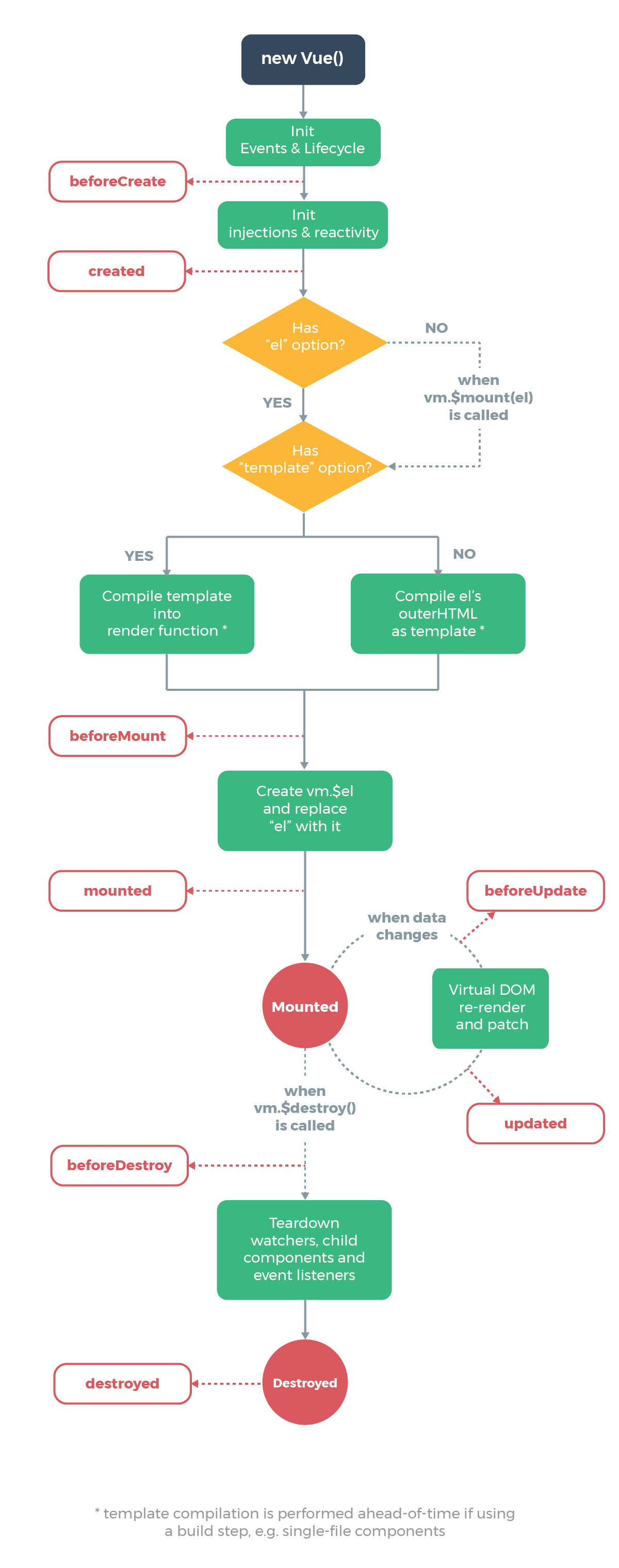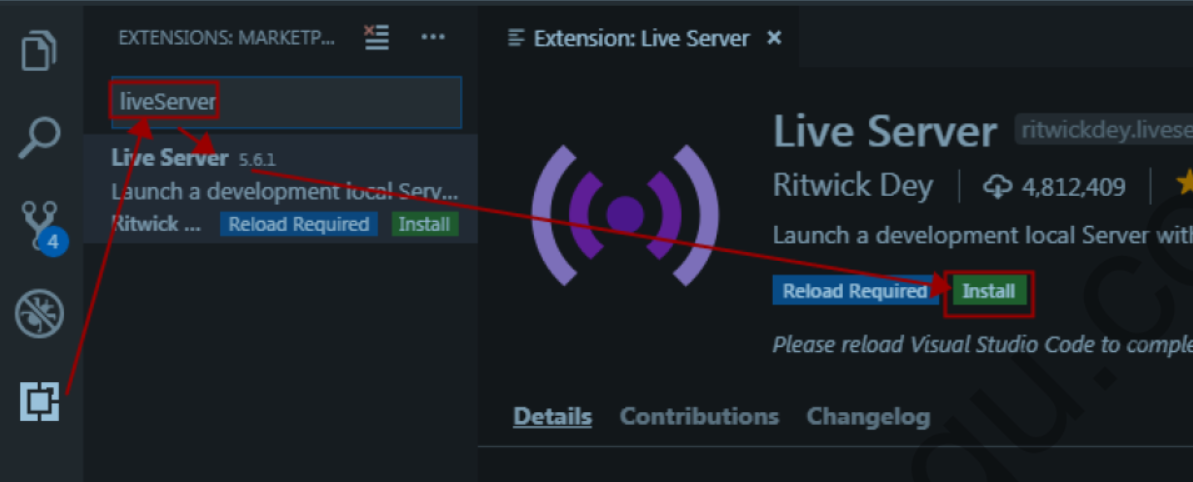Vue -- 09 life cycle and Ajax server communication
9.1 Vue instance lifecycle
Lifecycle hook function
Each Vue instance goes through a series of initialization processes when it is created
The life cycle is divided into three stages: initializing the display, updating the display, and destroying Vue instances
Hook function in initialization phase:
beforeCreate() before instance creation: neither data nor template was obtained
After the created() instance is created: data can be accessed at the earliest, but the template is not obtained
beforeMount() before data mounting: the template has been obtained, but the data is not mounted on the template.
mounted() after data mounting: the data has been mounted in the template
Hook function in update phase:
beforeUpdate() template update: before data changes, update the data template before calling.
updated() after the template is updated: render the data into the data template
Hook function in destruction phase:
beforeDestroy() before instance destruction
After the destroyed() instance is destroyed
Lifecycle diagram

DEMO
<body> <div id="app"> <h1>{{ msg }}</h1> </div> <script src="./node_modules/vue/dist/vue.js"></script> <script> var vm = new Vue({ //el: '#app', data: { msg: 'heloo' }, beforeCreate() { console.log('beforeCreate()', this.$el, this.$data) }, created() { // Initialized data Data, but the data is not mounted in the template console.log('created()', this.$el, this.$data) }, beforeMount() { // The template was obtained, but the data was not mounted on the template console.log('beforeMount()', this.$el, this.$data) }, mounted() { // The compilation is completed and the data has been mounted in the template console.log('mounted()', this.$el, this.$data) }, beforeUpdate() { // When data After changing, update the data in the template before calling. // Note: browser problem, need to use this.$el.innerHTML Get pre update Dom Template data console.log('beforeUpdate()', this.$el.innerHTML, this.$data) }, updated() { // data cover Vue After rendering Dom Data template console.log('updated()', this.$el.innerHTML, this.$data) }, beforeDestroy() { console.log('beforeDestroy'); }, destroyed() { console.log('destroyed'); } }).$mount('#app'); // Not used in instance el Options, available with $mount()Manual mount Dom // vm.$destroy() Destroy Vue example </script> </body>
9.2 liveServer server plug-in
1. Install the liveServer server plug-in in VS Code for Ajax interface calls

2. Start the server:
Method 1: open any html page, and you can see GoLive at the bottom. Click start. The default port is 5500
Method 2: right click the html page and click the following to access the page
Note: if you have started the server before, use mode 2 to start the html page. If you cannot use mode 1, the port will be occupied

3. Change the default port number of liveServer:
Press Ctrl + to open Settings. Open settings.json as follows,
Add "liveserver. Settings. Port" to the json file: 8080,

9.3 ajax libraries commonly used in Vue
At present, Vue officials do not have any built-in ajax request methods
1 vue-resource
In the vue1.x version, Vue resource, an unofficial Vue plug-in, is widely used
2 axios
In the vue 2 + version, it is officially recommended to use a great third-party ajax request library
Use: obtain data in combination with the life hook and render the data (created)
9.4 use of Vue resource
Reference Manual: https://github.com/pagekit/vue-resource/blob/develop/docs/http.md
NPM installation command: npm install vue-resource
<body> <div id="app"> <ul> <li v-for="(item,index) in msg" :key="index">{{item.name}}</li> </ul> </div> <script src="./node_modules/vue/dist/vue.js"></script> <script src="./node_modules/vue-resource/dist/vue-resource.js"></script> <script> new Vue({ el: '#app', data: { msg: [] }, created() { this.$http.get('http://127.0.0.1:5500/vue-07-lifecycle&ajax/db.json').then((response) => { // If you want to use Vue Instance this,You need to use the arrow function here // success callback console.log(response.data) // Response data this.msg = response.data }, (response) => { // error callback console.log(response.statusText) //error message }) } }); </script> </body>
9.5 use of Axios
Reference Manual: https://github.com/axios/axios/blob/master/README.md
npm install command: npm install axios
<body> <div id="app"> <ul> <li v-for="(item,index) in msg" :key="index">{{item.name}},{{item.age}}</li> </ul> </div> <script src="./node_modules/vue/dist/vue.js"></script> <script src="./node_modules/axios/dist/axios.js"></script> <script> new Vue({ el: '#app', data: { msg: [] }, created() { axios.get('http://127.0.0.1:5500/vue-07-lifecycle&ajax/db.json').then(response => { console.log(response.data) // Get the returned result data this.msg = response.data }).catch(error => { console.log(error.message) }) } }); </script> </body>
9.6 componentized axios communication
Add axios asynchronous access to the Bootstrap case in the previous chapter
Install NPM: NPM install Axios
Introduce axios.js
<script src="../node_modules/axios/dist/axios.js"></script>
emp.json
[ {"id": 1, "name": "Zhang San 1", "salary": 9899}, {"id": 2, "name": "Zhang San 2", "salary": 9999}, {"id": 3, "name": "Zhang San 3", "salary": 9099}, {"id": 4, "name": "Zhang San 4", "salary": 9199} ]
Refactoring AppHome.js
; (function () { const template = ` <div class="col-sm-9 col-sm-offset-3 col-md-10 col-md-offset-2 main"> <!--Upper right area--> <!--<h1 class="page-header">Dashboard</h1>--> <!--Define slot--> <slot name="dashboard"></slot> <dash-board :hobbies='hobbies' @del-Hobby="deleteHobby"></dash-board> <!--Lower right area--> <h2 class="sub-header">Section title</h2> <home-list :empList='empList' :delItem="delItem"></home-list> </div>`; window.AppHome = { template, components: { DashBoard, HomeList }, data() { return { hobbies: ['read a book', 'Billiards', 'sleep', 'Lu code'],//dashboard Display data empList: [] }; }, created() { axios.get('http://127.0.0.1:5500/vue-07-lifecycle&ajax/04-bootstrap-ajax/emp.json').then(response => { console.log(response.data) // Get the returned result data this.empList = response.data }).catch(error => { console.log(error.message) }) }, methods: { // Deletes the data of the specified subscript // Because delete emp Yes empList Do the update operation, // and empList It is initialized in the current component, so the deleted function should be defined in this component delItem(index) { this.empList.splice(index, 1); }, deleteHobby(index) { this.hobbies.splice(index, 1); } } } })()